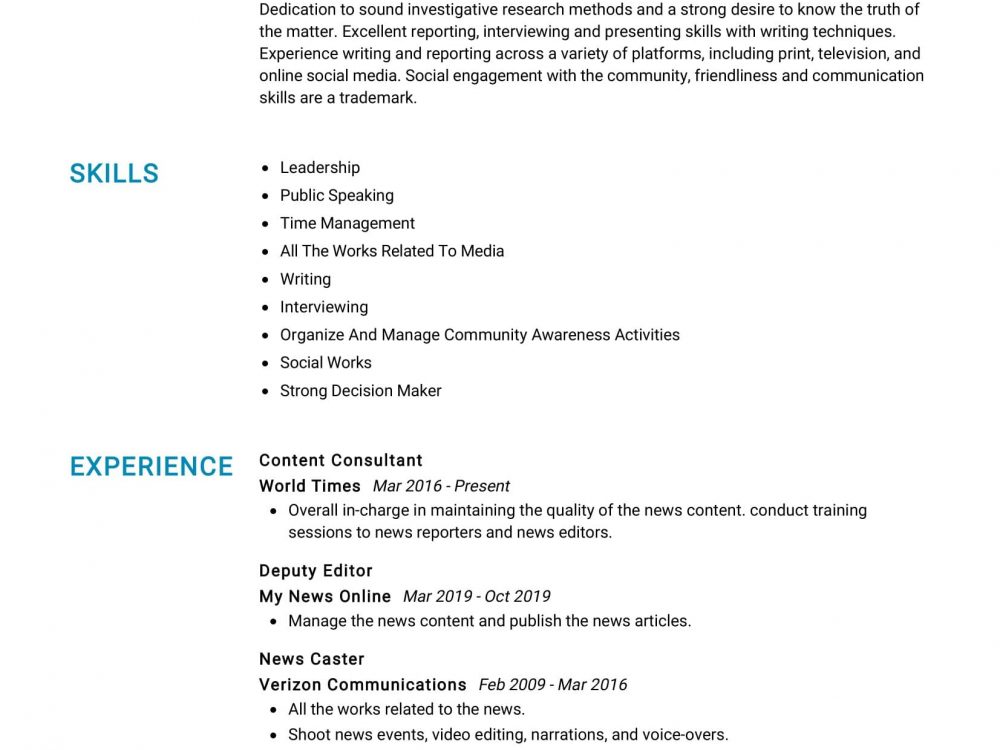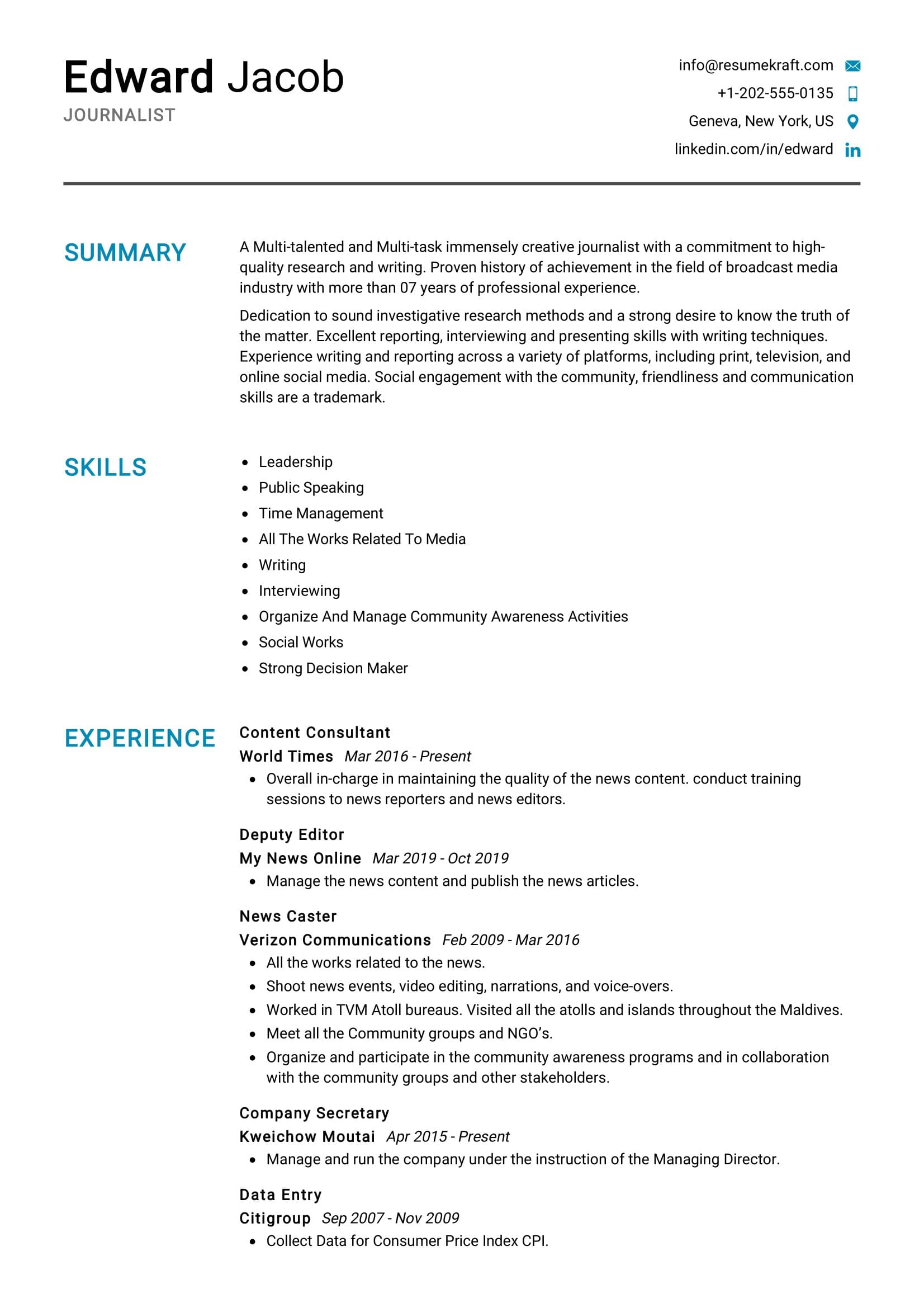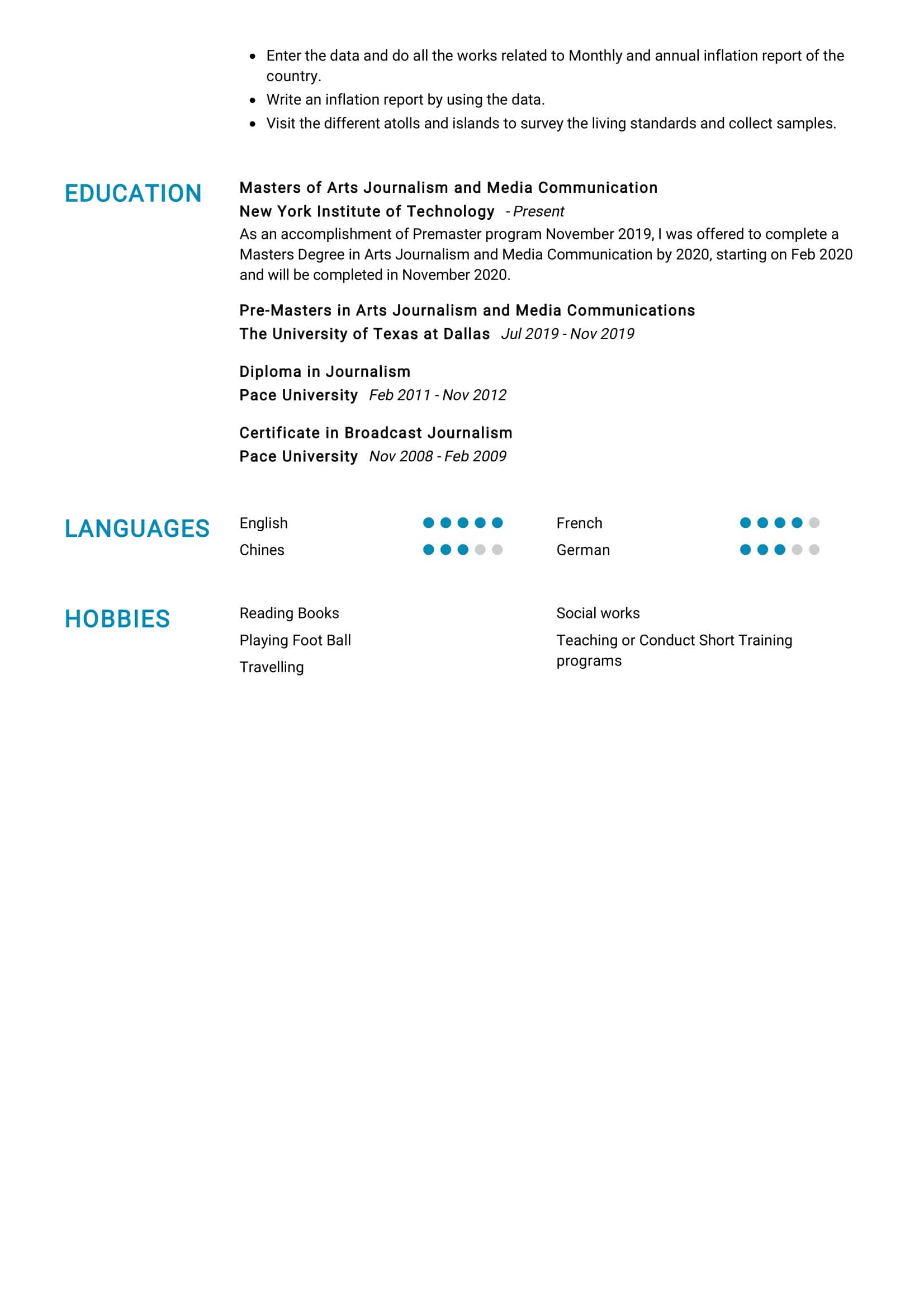Are you a Journalist by profession and looking for an exciting career? We have good news for you! use our professional Journalist Resume Sample. You don’t have to start writing from scratch. Just click “Edit Resume” and modify it with your details. Update the template fonts and colors have the best chance of landing your dream job. Find more resume samples.
Journalist Resume Sample
Edward Jacob
Journalist
Summary
A Multi-talented and Multi-task immensely creative journalist with a commitment to high-quality research and writing. Proven history of achievement in the field of the broadcast media industry with more than 07 years of professional experience.
Dedication to sound investigative research methods and a strong desire to know the truth of the matter. Excellent reporting, interviewing, and presenting skills with writing techniques. Experience writing and reporting across a variety of platforms, including print, television, and online social media. Social engagement with the community, friendliness, and communication skills are a trademark.
Skills
Work Experience
Content Consultant
World Times
Overall in-charge in maintaining the quality of the news content. conduct training sessions to news reporters and news editors.
Deputy Editor
My News Online
Manage the news content and publish the news articles.
News Caster
Verizon Communications
- All the works related to the news.
- Shoot news events, video editing, narrations, and voice-overs.
- Worked in TVM Atoll bureaus. Visited all the atolls and islands throughout the Maldives.
- Meet all the Community groups and NGO’s.
- Organize and participate in the community awareness programs and in collaboration with the community groups and other stakeholders.\
Company Secretary
Kweichow Moutai
Manage and run the company under the instruction of the Managing Director.
Data Entry
Citigroup
- Collect Data for Consumer Price Index CPI.
- Enter the data and do all the works related to Monthly and annual inflation report of the country.
- Write an inflation report by using the data.
- Visit the different atolls and islands to survey the living standards and collect samples.
Education
Masters of Arts Journalism and Media Communication
New York Institute of Technology
Pre-Masters in Arts Journalism and Media Communications
The University of Texas at Dallas
Diploma in Journalism
Pace University
Certificate in Broadcast Journalism
Pace University
Languages
- French
- English
- German
- Chines
Career Expert Tips:
- Always make sure you choose the perfect resume format to suit your professional experience.
- Ensure that you know how to write a resume in a way that highlights your competencies.
- Check the expert curated popular good CV and resume examples
Journalist Resume with Writing Guide
If you want to be a journalist, creating the perfect resume is imperative. Not only do employers traditionally look for resumes when screening job applicants, but it’s also the fastest way to get noticed and jumpstart your career.
This guide will walk you through creating a professional yet fresh-feeling journalist resume that highlights your strengths and leaves an impression on employers. There are plenty of websites that can help you build your resume, but as it turns out this is largely an art form. You need to know what employers are looking for, what they care about, how many words you should use (or not use), and how to present your work experience.
What is a Journalist?
A journalist is someone who writes news stories. In the past decade, the media landscape has been changing rapidly with the advent of social media sites like Facebook and Twitter. As a result, journalists have had to adjust their skills accordingly. There used to be a clear divide between print and broadcast journalism, but those lines have blurred over time.
Most recently, journalists have been asked to share their opinions on various topics in an effort to engage more people on social media. In essence, the ideal journalist is someone who can write news stories with a unique voice that engages and informs readers.
Journalist Resume Writing Guide:
1. Construct a Credibility Statement
First thing’s first when creating your journalist resume. A credibility statement is what makes up the first page of your resume – it’s the hook that catches the attention of employers. When you can clearly define what makes you different from other candidates, you will stand out to them and improve your chances of getting an interview.
A credibility statement should be brief (no more than one or two sentences) and highlight your skills or experience that set you apart from the competition. Having a unique voice for your resume doesn’t mean you have to be the best writer out there, but rather that you can show employers something unique about yourself.
2. Professional Accomplishments
The second section of your journalist resume needs to be about your professional accomplishments. This is the fastest way to show employers you are a leader in your field. You can include any awards or achievements you’ve received throughout your career, but keep in mind what employers really care about: results. It’s important to define what role you played in achieving the results and how they benefited others.
3. Work Experience
The last section of your journalist resume should be about your work experience. This is where you can really highlight what you’ve done and the skills you’ve gained throughout your career.
Keep in mind that employers will look at everything in your resume, so it’s important to be careful about what information you include. There are a few simple guidelines to follow when writing this section: include only relevant jobs, break out your work experience into categories (i.e.
Journalist Responsibilities:
- Understands the importance of customer service.
2.Writes clear, concise and objective content with minimum use of jargon or acronyms.
3.Holds effective listening skills as well as active verbal and non-verbal communication skills that are beneficial to the reader.
4.Has solid research ability in order to provide accurate and detailed information regarding the reporter’s subject matter expertise, background or areas that may be unfamiliar to readers.
5.Writes with an intended audience in mind.
6.Demonstrates the ability to edit work product for clarity, organization and style.
7.Works well independently or under pressure when writing and editing content within deadlines that are required by a publication or other medium of distribution.
8.Displays ability to meet project deadlines consistently and on time while working as part of a larger staff or group.
9.Displays the ability to work well as part of a team.
10.Displays the ability to use multimedia and other web-based resources properly and completely within deadlines (such as blogging, photo-shopping or posting content elsewhere).
11.Displays the ability to use non-verbal communication skills such as eye contact, body language, voice tone and presence to bring a message across effectively and appropriately.
12.Displays excellent oral communication skills that are beneficial to the reader (e.g. articulation, tone, pace, volume and diction).
13.Displays strong writing skills that are beneficial to the reader (such as grammar, spelling, punctuation and usage).
14.Displays the ability to use written language in a way that is effective for the reader’s purpose (e.g. for emphasis or layout purposes).
15.Translates complex ideas into simple written terms that are easy to understand and read quickly without confusion or ambiguity.
Top 10 Must-have Journalist Skills:
- Integrity/Honesty
- Attention to Detail
- Problem Solving
- Critical Thinking
- Critical Reading
- Editing Skills
- Grammar/Punctuation/Spelling
- Researching and Compiling Information with the use of the Internet and LexisNexis, Factiva, etc (compare article #s)
- Writing skills: editing, coordinating, contract negotiation, research (e-mails to sources and documentation), self-editing
- Solid communication skills: telephone, in-person, letter writing (also written communication)
What to Include in a Journalist Resume:
These are just a few of the things you should include on your resume. You might want to add more based on your personal experience and skill-set.
The industry has changed quite a bit in the past couple years, with companies outsourcing and using freelancers for many jobs previously done exclusively by in-house employees. Many freelancers are considered “hybrid” journalists, as they split their time between the field (reporting) and office work (researching online and via telephone.)
The following is a list of items to include in your resume. You might want to add your own experience under each category if you do not see something that fits your background. Again, consider the hybrid model for journalists who these days spend time both in the field and/or in an office environment.
- Education
–High school diploma or equivalent–College degree - Experience career related work: jobs with dates, responsibilities, skill sets (examples: writer, editor, reporter)
- Professional Master’s or PhD. degrees
- Internships and/or volunteer experience
- Awards and/or accomplishments
- References
- Work history (include dates of employment; resume length needed)
- Writing samples
- Web-links
Tips to write a Journalist Resume Summary:
- Use short, concise phrases. Avoid long sentences and paragraphs.
- Use strong action verbs that communicate your ability to perform the job (i.e., “Managed,” “Performed,” “Established,” “Wrote”).
- List your work experience in reverse chronological order (i.e., most recent first).
- Focus on your major achievements only.
- Ensure the resume is well-formatted and error-free.
- Maintain a good balance of white space and do not use fonts or colors that are too small to read clearly when printed on paper.
- Consider including a summary statement at the top of your resume, explaining why you would make an excellent candidate for the position.
- Keep the resume to one page, unless you have several years of experience to cover.
How to write a Journalist Resume with No experience:
- Use a simple, easy-to-read font and a well-organized layout.
- Use action verbs to describe your work with people, things and ideas to highlight your professional skills.
- Discuss your skills and experience in relation to the position you seek, using positive wording such as “solved” instead of “could not” or “improved.”
- Be honest about your education and employment background, including gaps in employment if relevant.
- Never lie, omit relevant information or embellish your resume.
- Display a variety of work samples in which you were involved.
- Use action verbs to describe your work with people, things, and ideas to highlight your skills.
- Make sure the document is neat and cleanly laid out, make it easy to read (avoid artistic fonts) and present yourself as competent professional (avoid creative spelling).
- Tailor your resume to each position for which you are applying.
Tips to write a Journalist Cover Letter:
- Use your cover letter to introduce yourself to the editor. Tell them a little about yourself, what you do and the section of journalism you’re applying for.
- Use extreme clarity when describing in writing your skills, abilities and how they will benefit the publication or why they’ll make you a great fit. This is where you can be creative and show off your personality.
- If possible, stick with the subject of your area of journalism experience (the job title or section). Don’t repeat your experience in other areas.
- Make a list of names you’re emailing and don’t include your contact information. You can always provide it on an email from TheJournalistsWoman@gmail.com as a way of saying, “I know this is awkward but please keep these things confidential.”
- While you’re not required to do this, it is advised that you write at least one sample publication or story in the subject area that you’re applying for.
Key Takeaways:
- Customize the resume (or CV) to what the specific employer is looking for. They won’t want you to send them something generic that is already out there – they want to be impressed with your work, so show them how great you are!
- Always include your skills and abilities first. You may have experience that will stand out among the crowd, so always highlight these first.



